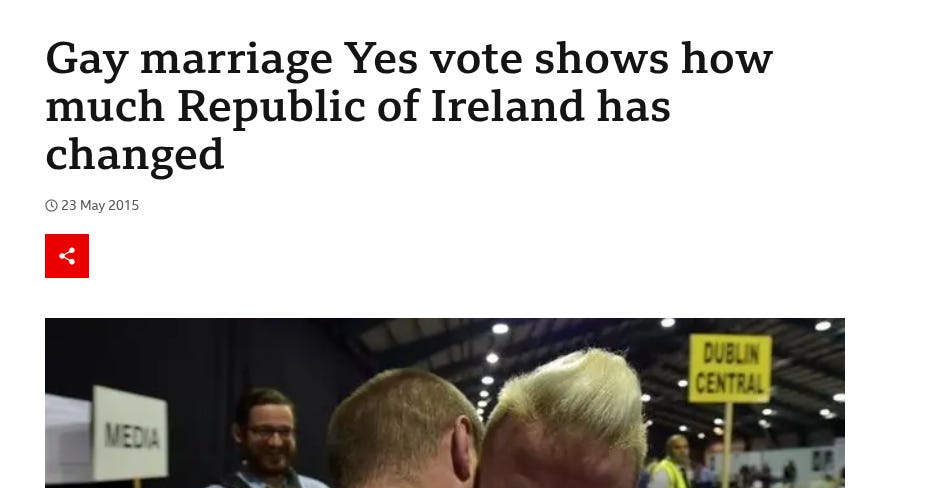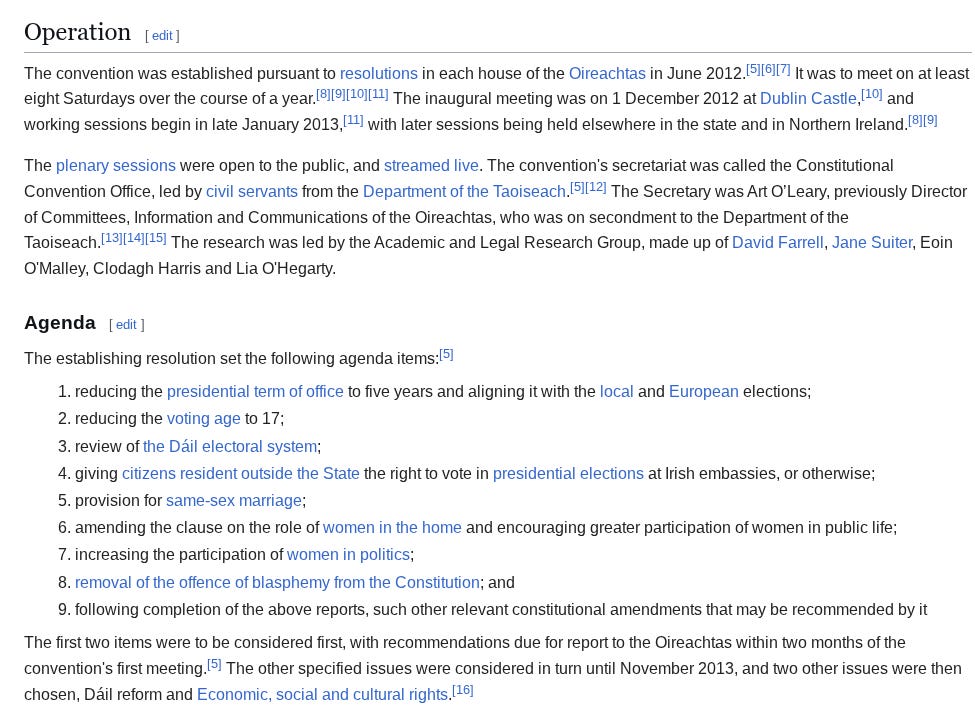The Golden Age
Was 2015's marriage referendum the most significant political event to happen in Ireland since the financial crisis?
The Irish Referendum which allowed for the legalisation of same-sex marriage is 10 years old this year. The passage of time has a way of flattening and defanging political events to turn them into neat parables; the vote is fondly remembered by Irish people as a milestone in our modernisation, and a joyous win for social justice, so the anniversary articles have taken that cosy angle.
But it was so much more than that. Nostalgia aside, the vote was one of the most significant political and cultural events since the crash and not for the reason that everyone suspects. Its impact is not in the specific social change the referendum brought in (which Irish people are happy about) but the political pattern it established, which is only now breaking apart.
To understand why the referendum was so important you have to go back a few years. Up until the 2008 crash Ireland was on a continuous upward curve of modernisation, liberalisation and prosperity. The story that’s told about Ireland, and that we told about ourselves, was that after years of poverty and oppression things seemed to be getting better and better, assisted by things like the collapse of the church and the peace process. But it’s important to remember that material success was the key to that feeling - it was the thing that proved the change was real.
Then crash introduced a discordant note into the music of Irish progress. There was a sense that we had failed because we had dragged something rotten with us from Ireland’s past into our future. The bust curdled our sense of the boom in retrospect. The public feeling was that the benefits of prosperity hadn’t been evenly distributed, and the architects of the collapse seemed to the public to essentially get away with it; so maybe hierarchical and crooked old Ireland hadn’t changed that much after all. What we ended up with was much the same country with an ego, and some gold plating on it. To over-extend the metaphor, the gold plating had peeled off in the rain and it was the same old rustbucket underneath.
As I outlined here, in the elections immediately following the crash all party manifestos reflected the demand from the public that something - anything - fundamental about how the country functioned had to change. But in Ireland any change like that would have to the impossible task of accommodating the two ends of the spectrum that are permissible in the system - that is, the managerial and ideologically brain-dead status-quo parties on the one hand, and various forms of Left (activist, professional, populist) on the other. The former, personified by Fianna Fáil and Fine Gael, didn’t really want to change anything; and the latter wanted the same redistributive stuff they always want, crash or no crash.
After this feeling had worked its way through the digestive system of the political process, the fudge that the mainstream landed on was that we would update our constitution; and that that would hopefully somehow represent sufficiently radical change so that people could feel that a system which had let us down hadn’t made it through the collapse unchanged.
In the end a Fine Gael-Labour coalition was elected and established a Constitutional Convention to consider proposed amendments to the constitution. The Convention would have a public element, but consider a slate of modernising proposals selected by the government and shepherded by experts. (In time the Convention would be replaced with a Citizen’s Assembly doing much the same work, but more so.) One of the proposals coming through that Constitutional Convention was the legalisation of same-sex marriage.
It’s important to understand why same-sex marriage stands out here and why the ethusasitic ratification of it by the Irish people meant something different that the other proposals. A lot of the changes being considered, like the removal of the blasphemy clause, were the low-hanging political fruit of a rapidly modernising country - it was just Ireland catching up with the countries around it. Some of it (like legalising abortion, and the role of women) also represented part of a programme of moral change that liberal Ireland had wanted for years but been unable to get through.
But same-sex marriage was different. It was the first instance of us not merely catching up to modernity but leading the way. When it came to the vote, that meant it was a transformative experience for politicians and the people. Irish people loved the praise that it earned them and the reframed story that it told about Ireland. Again: all of this should be understood in the context of the boom and the crash.
It’s hard to describe the euphoric feeling that accompanied the referendum result. The celebration of the result on the grounds of Dublin Castle was like that for a late-round World Cup victory. Then Taoiseach Enda Kenny said that “with today's Yes vote we have disclosed who we are – a generous, compassionate, bold and joyful people", and his speech emphasized Ireland's pioneering leadership in the world and the widespread sense that this vote had reframed Ireland’s national story and it’s relationship with it’s past.
The vote had been marked by celebrity endorsements and a campaign called “home to vote” where Irish people abroad were encouraged to make the pilgrimage back to the motherland and endorse our transition to enlightened modernity.
As you can see by the language used in the headlines below, International coverage in places like New York Times and the BBC highlighted Ireland's soft power and presented Ireland as a beacon of liberalism and inclusivity, contrasting with its past as a cramped and dismal past as a religious autocracy. There is a long list here of the acclaim heaped on the Irish people for their bravery and foresight, from esteemed and respectable personages across the globe.

A Red C poll published afterwards recorded that the proportion of people who thought Ireland was a leader in Europe on human rights and equality rose by 15 percentage points after the referendum.
Politicians were no less euphoric than the public; but for them, the referendum was more than just a discrete moment of social justice. They became aware that being at the vanguard of turbo-modernisation, and hitching your national identity progressivism, could serve a variety of purposes. First and most importantly, it would give people the feeling of forward momentum and structural change that was lacking on many of the practical issues Irish voters were concerned about.
Both before and after the crash the big issues in the country were deep, structural, practical ones related to housing, healthcare and in the last few years to immigration. During the entire period the issues seemed to be static – people complained about them constantly and they were always the most central issues in any election, yet there was the feeling when the next election rolled around, that nothing had changed and no deep change had even been attempted.
That inertia, which emenated not just from politicians but the people who kept voting mainstream status quo parties back into office, reflected a feeling that not only did they not want to truly change anything, but also that they didn’t know what to do, and didn’t believe anything they could do would be effective. Again, all this had to be seen in light of both the boom and the bust, and the journey the latter represented the end of. The government had lost the belief that it understood how to make people richer, build things, or address systemic material issues.






